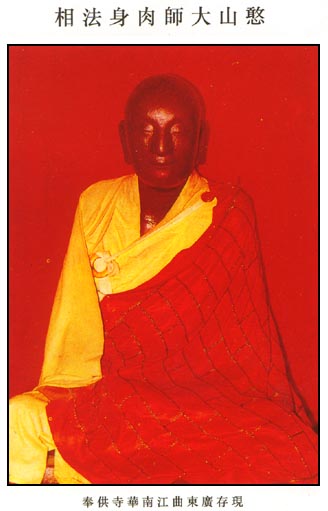
|

Introduction
To a traveler on the Chan Path, as it is to a traveler on any arduous journey, hostelries, sign posts, and an occasional helping hand are indispensable. Especially when the way is difficult, a traveler requires a safe place to rest just as he needs to know his location. Should he stumble, he’ll need an outstretched hand. Should he find himself hopelessly lost, he’ll require directions from someone who well knows the way.
In Chan, every wayfarer knows that he can find refuge in the Buddhist Dharma. There is always room for him in that most comfortable of Inns. And reflection upon his improving sense
of well-being—that peace, joy, and freedom he increasingly feels—will reliably locate his position on the steep ascent.
But what about those critical times when he finds himself fallen or lost? Who will arrive to extend a helping hand and be his companion until he is healed and steady on his feet? When
he is confused, who will be there to point him in the right direction? When he is lost, whose footprints will appear to lead him back to the True Path?
To a traveler on the Chan Path, that helping hand, that good advice and companionship are provided by Master Han Shan. Those trusted footprints are his, too.
How, the modern traveler may ask, can the autobiography of a 16th century peripatetic Chinese Master possibly be relevant in today’s jet-age society? He will laugh to think that in Han Shan’s day, railroad trains, now quaint and obsolete, were not to be invented until centuries in the future.
And he who customarily relies upon the clear, precise recordings of Silicon Valley technology will surely doubt that he can find anything useful in the faded brushstroke recollections of a fellow who called himself Han Shan . . . “Silly Mountain.”
But the human soul does not submit to scientific scrutiny. The journey to Nirvana is not made by space shuttle or the Union Pacific. Today, as it was in Siddhartha’s day, progress on
the Path is gained by the acquisition of love and understanding and humility. Han Shan helps us to acquire these treasures.
Who among us has never chafed at the dictates of his parents, at that exercise of parental authority which, in the name of “doing what was best in the long run” forced him to commit
to a course he did not wish to follow? Before that “long run” occurs, years of resentment intervene. Anyone who still bears even a residue of such resentment will surely benefit from Han Shan’s experience. Sadly he relates that as a happy thriving boy, he was told that he must be sent away to a distant school “to receive the best education possible.”
Separation from all he knew and loved—especially
from his beloved mother—was for him unthinkable, and so he protested grievously, repeatedly refusing to board the ferry that would carry him away. Imagine the pain and chagrin he felt when his mother personally ordered him thrown into the river, turned her back to his cries and walked away, leaving him
no choice but to turn to others for help. His love for her turned into contempt and the kind of bitterness that can only be cured by indifference. Imagine the pain he felt when as a mature adult he learned that in the days and years following his departure, his mother would go regularly to the river’s edge and sit and weep because she loved and missed him so.
Han Shan is justly regarded as one of China’s greatest poets. Wherever he went people clamored for his writings. Those who succeeded in getting him to compose a verse for them treated
the lines like a trophy. But Han Shan knew all too well that the proficiency and the insights that gained him such acclaim were the products of that “best possible education” his mother had paid so dearly to obtain for him, and his anger, contempt and indifference melted into shame. For love of him she had sacrificed here own happiness, and he had rewarded her great
love with a wretched stone of silence. Can we not all learn from this experience?
Who among us has never been accused of an offense of which he is innocent? And if he has thus far escaped, who can fail to fear the possibility of tomorrow’s accusations? If he cannot
prove his innocence, how will he bear his punishment? Will he become as detestable as the lie, or will he retain his dignity and continue to pursue his goals despite the obstacles such calumny presents? Han Shan was falsely accused of a crime, and the record of his personal conduct will serve as an exemplar for anyone who suffers such misfortune.
Who among us has never had his mind so swollen with self-righteous pride that it lost all capacity to perceive
the truth? As Han Shan’s intellectual powers began to rise, his ego inflated as if keeping pace. He became so arrogant that he nearly severed his relationship with his best friend because that friend did not accord him proper courtesies. We will remember the “dressing down” given him by a spiritual superior,
a chastisement that brought him to his senses.
On every page the text teems with valuable lessons. The maxims, too, are marvelously instructive because, being so
sharp and penetrating, they come quickly to the core of all our confusions. The light of Han Shan’s genius then shines in and leads us forward in our quest for spiritual clarity. In the words of Han Shan’s 11th maxim:
After reading Han Shan, we are not
so casual about our emigrations.
Reverend Chuan Yuan (Ming Zhen) Shakya
|